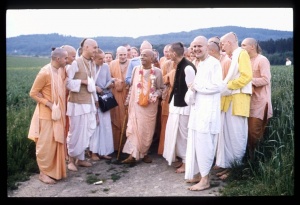CC Adi 2.30 (1975): Difference between revisions
(Vanibot #0027: CCMirror - Mirror CC's 1996 edition to form a basis for 1975) |
(Vanibot #0020: VersionCompareLinker - added a link to the Version Compare feature) |
||
| Line 2: | Line 2: | ||
<div style="float:left">'''[[Sri Caitanya-caritamrta (1975)|Śrī Caitanya-caritāmṛta (1975)]] - [[CC Adi (1975)|Ādi-līlā]] - [[CC Adi 2 (1975)|Chapter 2: Śrī Caitanya Mahāprabhu Is the Supreme Personality of Godhead]]'''</div> | <div style="float:left">'''[[Sri Caitanya-caritamrta (1975)|Śrī Caitanya-caritāmṛta (1975)]] - [[CC Adi (1975)|Ādi-līlā]] - [[CC Adi 2 (1975)|Chapter 2: Śrī Caitanya Mahāprabhu Is the Supreme Personality of Godhead]]'''</div> | ||
<div style="float:right">[[File:Go-previous.png|link=CC Adi 2.29 (1975)|Ādi-līlā 2.29]] '''[[CC Adi 2.29 (1975)|Ādi-līlā 2.29]] - [[CC Adi 2.31 (1975)|Ādi-līlā 2.31]]''' [[File:Go-next.png|link=CC Adi 2.31 (1975)|Ādi-līlā 2.31]]</div> | <div style="float:right">[[File:Go-previous.png|link=CC Adi 2.29 (1975)|Ādi-līlā 2.29]] '''[[CC Adi 2.29 (1975)|Ādi-līlā 2.29]] - [[CC Adi 2.31 (1975)|Ādi-līlā 2.31]]''' [[File:Go-next.png|link=CC Adi 2.31 (1975)|Ādi-līlā 2.31]]</div> | ||
{{CompareVersions|CC|Adi 2.30|CC 1975|CC 1996}} | |||
{{RandomImage}} | {{RandomImage}} | ||
==== TEXT 30 ==== | ==== TEXT 30 ==== | ||
| Line 12: | Line 11: | ||
:nārāyaṇas tvaṁ na hi sarva-dehinām | :nārāyaṇas tvaṁ na hi sarva-dehinām | ||
:ātmāsy adhīśākhila-loka-sākṣī | :ātmāsy adhīśākhila-loka-sākṣī | ||
:nārāyaṇo | :nārāyaṇo 'ṅgaṁ nara-bhū-jalāyanāt | ||
:tac cāpi satyaṁ na tavaiva māyā | :tac cāpi satyaṁ na tavaiva māyā | ||
</div> | </div> | ||
| Line 27: | Line 26: | ||
<div class="translation"> | <div class="translation"> | ||
"O Lord of lords, You are the seer of all creation. You are indeed everyone's dearest life. Are You not, therefore, my father, Nārāyaṇa? Nārāyaṇa refers to one whose abode is in the water born from Nara [Garbhodakaśāyī Viṣṇu], and that Nārāyaṇa is Your plenary portion. All Your plenary portions are transcendental. They are absolute and are not creations of māyā." | |||
</div> | </div> | ||
| Line 34: | Line 33: | ||
<div class="purport"> | <div class="purport"> | ||
This statement, which is from Śrīmad-Bhāgavatam ([[SB 10.14.14]]), was spoken by Lord Brahmā in his prayers to Lord Kṛṣṇa after the Lord had defeated him by displaying His mystic powers. Brahmā had tried to test Lord Kṛṣṇa to see if He were really the Supreme Personality of Godhead playing as a cowherd boy. Brahmā stole all the other boys and their calves from the pasturing grounds, but when he returned to the pastures he saw that all the boys and calves were still there, for Lord Kṛṣṇa had created them all again. When Brahmā saw this mystic power of Lord | This statement, which is from Śrīmad-Bhāgavatam ([[SB 10.14.14]]), was spoken by Lord Brahmā in his prayers to Lord Kṛṣṇa after the Lord had defeated him by displaying His mystic powers. Brahmā had tried to test Lord Kṛṣṇa to see if He were really the Supreme Personality of Godhead playing as a cowherd boy. Brahmā stole all the other boys and their calves from the pasturing grounds, but when he returned to the pastures he saw that all the boys and calves were still there, for Lord Kṛṣṇa had created them all again. When Brahmā saw this mystic power of Lord Kṛṣṇa's, he admitted defeat and offered prayers to the Lord, addressing Him as the proprietor and seer of everything in the creation and as the Supersoul who is within each and every living entity and is dear to all. That Lord Kṛṣṇa is Nārāyaṇa, the father of Brahmā, because Lord Kṛṣṇa's plenary expansion Garbhodakaśāyī Viṣṇu, after placing Himself on the Garbha Ocean, created Brahmā from His own body. Mahā-Viṣṇu in the Causal Ocean and Kṣīrodakaśāyī Viṣṇu, the Supersoul in everyone's heart, are also transcendental expansions of the Supreme Truth. | ||
</div> | </div> | ||
Latest revision as of 16:57, 26 January 2020

A.C. Bhaktivedanta Swami Prabhupada
TEXT 30
- nārāyaṇas tvaṁ na hi sarva-dehinām
- ātmāsy adhīśākhila-loka-sākṣī
- nārāyaṇo 'ṅgaṁ nara-bhū-jalāyanāt
- tac cāpi satyaṁ na tavaiva māyā
SYNONYMS
nārāyaṇaḥ—Lord Nārāyaṇa; tvam—You; na—not; hi—certainly; sarva—all; dehinām—of the embodied beings; ātmā—the Supersoul; asi—You are; adhīśa—O Lord; akhila-loka—of all the worlds; sākṣī—the witness; nārāyaṇaḥ—known as Nārāyaṇa; aṅgam—plenary portion; nara—of Nara; bhū—born; jala—in the water; ayanāt—due to the place of refuge; tat—that; ca—and; api—certainly; satyam—highest truth; na—not; tava—Your; eva—at all; māyā—the illusory energy.
TRANSLATION
"O Lord of lords, You are the seer of all creation. You are indeed everyone's dearest life. Are You not, therefore, my father, Nārāyaṇa? Nārāyaṇa refers to one whose abode is in the water born from Nara [Garbhodakaśāyī Viṣṇu], and that Nārāyaṇa is Your plenary portion. All Your plenary portions are transcendental. They are absolute and are not creations of māyā."
PURPORT
This statement, which is from Śrīmad-Bhāgavatam (SB 10.14.14), was spoken by Lord Brahmā in his prayers to Lord Kṛṣṇa after the Lord had defeated him by displaying His mystic powers. Brahmā had tried to test Lord Kṛṣṇa to see if He were really the Supreme Personality of Godhead playing as a cowherd boy. Brahmā stole all the other boys and their calves from the pasturing grounds, but when he returned to the pastures he saw that all the boys and calves were still there, for Lord Kṛṣṇa had created them all again. When Brahmā saw this mystic power of Lord Kṛṣṇa's, he admitted defeat and offered prayers to the Lord, addressing Him as the proprietor and seer of everything in the creation and as the Supersoul who is within each and every living entity and is dear to all. That Lord Kṛṣṇa is Nārāyaṇa, the father of Brahmā, because Lord Kṛṣṇa's plenary expansion Garbhodakaśāyī Viṣṇu, after placing Himself on the Garbha Ocean, created Brahmā from His own body. Mahā-Viṣṇu in the Causal Ocean and Kṣīrodakaśāyī Viṣṇu, the Supersoul in everyone's heart, are also transcendental expansions of the Supreme Truth.